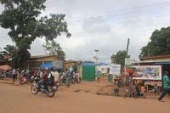Hunger threatens to undermine Ebola quarantine measures, warns charity

Kenema Hospital, Sierre Leone
The risk of hunger and malnutrition within Ebola-hit communities in West Africa is threatening to undermine the effectiveness of quarantine measures and, with it, the wider Ebola response, warns Christian Aid.
As the rate of infection continues to rise, the agency is calling on the international community to address the problem of food insecurity for over a million people in quarantine in Sierra Leone.
With hospitals and treatment centres overstretched and at capacity, effective but humane quarantine measures are key to halting the spread of the virus, says Christian Aid. Adrian Ouvry, Christian Aid’s Humanitarian Programmes Manager, said: “Households, neighbourhoods and even entire districts have been isolated in Sierra Leone.
“To break the chain of transmission, you have to limit people’s movements, but it is counter-productive to restrict their movement without addressing their basic needs. Endemic poverty, increased food prices and limited support to affected communities are forcing people to leave quarantined homes to fend for their families – increasing the chances of transmitting the virus to others.
“If you are a parent with hungry children, then you have no choice but to think about your day-to-day survival, and in order to survive, families in Sierra Leone are having to break quarantine in order to earn money and buy food. We do not want a situation where a parent is faced with only two options: the risk of exposing themselves and potentially others to the virus, or the risk of seeing their children go hungry.
“Governments and aid agencies must recognise that quarantine will only be effective if those who are isolated are guaranteed a sufficient and constant supply of nutritious food and clean water. Otherwise, the issue of hunger and food security will undermine the success of quarantine measures.”
The World Food Programme has begun providing emergency food assistance to over a million people across Guinea, Sierra Leone and Liberia. The rations include a month’s worth of rice, pulses, vegetable oil and salt for families. However, much more is needed.
Former nurse Theresa Bagrey, Christian Aid’s senior programme officer for community health, based in Freetown, said: “Many people here in Freetown still need to go out every day to find their daily bread. Markets are still crowded and busy, as people move about and try desperately to buy, sell and scrape together a living. Meanwhile, the rations given to quarantined homes do not appear to be enough and nutritional value is a problem. These issues must be addressed.”
To date, over 4,500 people in West Africa have died from the Ebola virus disease. While the global response has focused largely on medical treatment, the threat of widespread hunger could destabilise efforts to curb the outbreak, Christian Aid warns.
Adrian Ouvry said: “So far, much of the media attention has been on the urgent need for medical treatment, which is vital, and we welcome the current efforts by governments and aid agencies alike. However, the international community risks leaving out a very important element of a successful response: that is, looking after survival needs of those immediately affected by the epidemic.
“In Sierra Leone farmers are unable to plant or harvest, which in turn has major implications for the rest of the food chain. There are widespread restrictions on the transportation of foodstuffs and weekly local markets are closed. As a result, the cost of food commodities is rising sharply, affecting the quality and quantity of meals families can afford to eat. For example, the price of a 50kg bag of rice – Sierra Leone’s staple food – has risen by over £5. These disruptions can cause immense hardship, particularly for the many people living a hand-to-mouth existence.”
Christian Aid has been working in Sierra Leone for over 25 years, delivering development programmes through local partners to tackle issues such as gender-based violence and HIV. The organisation has mobilised existing networks, including 9,000 volunteers across nine districts, to respond to the Ebola crisis, focusing on carrying out health education in local communities to raise awareness of preventative measures.
Source: Christian Aid





















